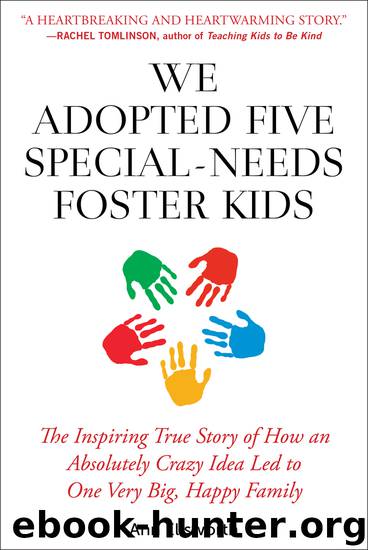We Adopted Five Special-Needs Foster Kids by Ann Ellsworth

Author:Ann Ellsworth
Language: eng
Format: epub
ISBN: 9781510745308
Publisher: Skyhorse
Published: 2019-08-07T16:00:00+00:00
14
USE YOUR WORDS
The modifiers just kept coming. We had a bank of impoverished words to further describe the children we were raising: oppositional, delayed, high risk, conduct disorder, self-harming, at risk, dysthymic . . . We needed a Punnett square to help parse the behaviors and motivations; is this a dominant emotion or a double recessive? The list was endless.
Our kids are missing some basic emotions. Most children with early trauma don’t experience guilt. They skip remorse and go directly to shame; they haven’t done something bad—they are bad. I am always careful to distinguish, “You’re a family girl now, you don’t need to steal anymore. You’re a great kid, you made a poor choice and now you need to take responsibility for that choice.” We wrote letters to the victims of our frequent thefts, “Dear Store, I am a bad girl . . .” Whoa! Let’s try that again. Language is important, especially when one poorly chosen word can derail a kid into self-loathing.
Some of our kids don’t experience empathy. It’s not their fault. My parent impulse is to ask, “How would it make you feel if someone took your stuff? Would you like it if someone hit you and called you names?” The very question is an insult to their reality. I should be asking, “How would it make you feel to be loved and respected? Would you like it if someone cared about you and told you how precious you are?” It’s a daily exercise.
We work on social cues. “When people are talking, you must wait your turn.” The kids want to know, “How long do I wait? How do I know when it’s my turn?” These are real questions, ones that are easier to practice than answer. I tell them families are where we practice appropriate behavior and making good choices.
We practice hugging, listening to our bodies, telling us when it’s time to let go. “Mom! It’s just like in music, when it starts to slow down, we know it’s almost over!” I say, “Hanging out like this, talking about stuff? This is what parents do who love their children.” I tell the kids when I am loving them, I make a point of pointing it out. Because they don’t feel or recognize love. Yet. Maybe never. Keep trying.
Our kids don’t know trust. I explain it, give examples, at times saying, “Just try it! Pretend you trust me and see what happens!” Dan says they have to learn to trust, and if they can’t trust us, we must give them an environment they can trust, a home for them that is predictable and consistent with clear expectations and clear consequences. I hang two whiteboards in the kitchen, one for our daily schedule, in fifteen-minute intervals, one for the weekly schedule, and a large paper calendar for our month, color coded by child. Planning is key.
If a child is acting out, I first ask myself, Have I done my job? Did they get enough sleep? Is their
Download
We Adopted Five Special-Needs Foster Kids by Ann Ellsworth.epub
This site does not store any files on its server. We only index and link to content provided by other sites. Please contact the content providers to delete copyright contents if any and email us, we'll remove relevant links or contents immediately.
The Lost Art of Listening by Michael P. Nichols(7506)
Rich Dad Poor Dad by Robert T. Kiyosaki(6632)
We Need to Talk by Celeste Headlee(5615)
I Love You But I Don't Trust You by Mira Kirshenbaum(3876)
The Complete Idiot's Guide to Coping With Difficult People by Arlene Uhl(3149)
Rich Dad Poor Dad: What The Rich Teach Their Kids About Money - That The Poor And Middle Class Do Not! by Robert T. Kiyosaki(2958)
A Burst of Light by Audre Lorde(2607)
The Book You Wish Your Parents Had Read (and Your Children Will Be Glad That You Did) by Philippa Perry(2528)
Dealing with People You Can't Stand by Dr. Rick Brinkman(2460)
Life Hacks by Dan Marshall(2456)
An Odyssey by Daniel Mendelsohn(2309)
The Expectant Father by Armin A. Brott & Jennifer Ash(2273)
Teach Your Child How to Think by Edward De Bono(2159)
No Time to Say Goodbye(2117)
What I Need by J. Daniels(2082)
The 7 Habits Of Highly Effective Teens by Covey Sean(2080)
The Out-of-Sync Child by Carol Stock Kranowitz(2054)
The Anxious Generation by Jonathan Haidt(2051)
I Don't Belong to You by Keke Palmer(2005)
